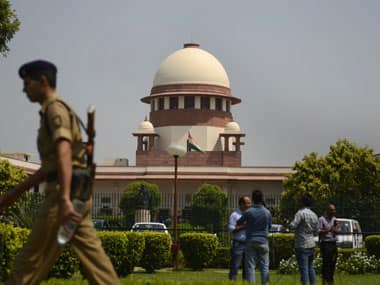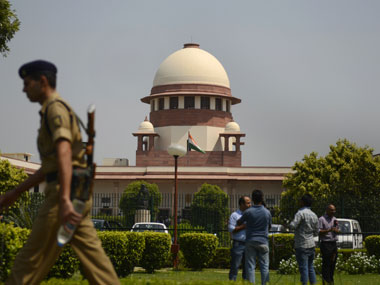New Delhi: Tamil Nadu on Wednesday told the Supreme Court that the state governments can on their own decide to suspend or remit sentences of convicts and the statutory powers to grant mercy to them is not dependent on conditions. “We do not have to wait for any application. The state government can exercise the power under the CrPC if situation demands. Power to grant mercy cannot be based on conditions,” the counsel for Tamil Nadu told a five-judge Constitution bench headed by Chief Justice H L Dattu. Senior advocate Rakesh Dwivedi, representing Tamil Nadu, referred to the provisions of the Code of Criminal Procedure to buttress the point that the state government is empowered to take a call in certain cases and Centre should not tread into its territory. [caption id=“attachment_2380606” align=“alignleft” width=“380” class=" “]
 AFP image.[/caption] “When any person has been sentenced to punishment for an offence, the appropriate Government may, at any time, without conditions or upon any conditions which the person sentenced accepts, suspend the execution of his sentence or remit the whole or any part of the punishment to which he has been sentenced,” one of the parts of Section 432 of CrPC reads. Dwivedi, dealing with the relevant legal provisions, said that the state government may require the opinion of the presiding judge of the court which had confirmed the sentence of the convict before taking a decision on remission pleas. The words – “may require” – make the conditions optional, the lawyer told the bench which also comprised Justices F M I Kalifulla, Pinaki Chandra Ghosh, Abhay Manohar Sapre and U U Lalit. The bench is going into the maintainability of the Centre’s petition opposing Tamil Nadu government’s decision to set free the convicts in the Rajiv Gandhi assassination case after remitting their life sentences Besides the maintainability of the plea, the bench would also decide whether the sentence of a prisoner, whose death penalty has been commuted to life, can be remitted by the state government. It would also decide whether life term meant jail term for rest of the life or a convict has a right to claim remission. Earlier, Tamil Nadu government had trashed accusations that its decision to release seven Rajiv Gandhi assassination case convicts was “political and arbitrary”. Tamil Nadu had also asked why Congress governments at the Centre had delayed the decision on mercy pleas that led to commutation of their death sentence in the first place. “Why UPA-I and UPA-II did not hang the killers of Rajiv Gandhi in ten years of its rule?” the counsel for the state had posed. The apex court had on June 28 rejected the curative petition of the Centre against the commutation of death penalty into life imprisonment of three convicts in the case. The review pleas, challenging the commutation of death penalty to life term of Santhan, Murugan and Perarivalan, were dismissed by the court in February last year on the ground of 11-year delay in deciding their mercy petitions. The three convicts are lodged in a Vellore prison. Former Prime Minister Rajiv Gandhi was assassinated on May 21, 1991 at Sriperumbudur in Tamil Nadu. The court would resume hearing tomorrow. Earlier, the Centre had asserted that the killers of Gandhi did not deserve to be shown any mercy as the assassination was the result of a conspiracy involving foreign nationals. Among the seven convicts, V Sriharan alias Murugan, Santhan, Robert Pious and Jaya Kumar are Sri Lankan nationals, while female convict Nalini, Ravichandran and Arivu are Indians. The court, on a plea of the erstwhile UPA government, had on February 20 last year stayed the state government’s decision to release Murugan, Santhan and Arivu, whose death sentences had been commuted to life term by it. It had later also stayed the release of four other convicts Nalini, Robert Pious, Jayakumar and Ravichandran, noting there were procedural lapses on the part of the state government. Santhan, Murugan and Arivu are currently lodged in the Central Prison, Vellore. The other four are also undergoing life sentence for their role in Gandhi’s assassination on 21 May, 1991. PTI
AFP image.[/caption] “When any person has been sentenced to punishment for an offence, the appropriate Government may, at any time, without conditions or upon any conditions which the person sentenced accepts, suspend the execution of his sentence or remit the whole or any part of the punishment to which he has been sentenced,” one of the parts of Section 432 of CrPC reads. Dwivedi, dealing with the relevant legal provisions, said that the state government may require the opinion of the presiding judge of the court which had confirmed the sentence of the convict before taking a decision on remission pleas. The words – “may require” – make the conditions optional, the lawyer told the bench which also comprised Justices F M I Kalifulla, Pinaki Chandra Ghosh, Abhay Manohar Sapre and U U Lalit. The bench is going into the maintainability of the Centre’s petition opposing Tamil Nadu government’s decision to set free the convicts in the Rajiv Gandhi assassination case after remitting their life sentences Besides the maintainability of the plea, the bench would also decide whether the sentence of a prisoner, whose death penalty has been commuted to life, can be remitted by the state government. It would also decide whether life term meant jail term for rest of the life or a convict has a right to claim remission. Earlier, Tamil Nadu government had trashed accusations that its decision to release seven Rajiv Gandhi assassination case convicts was “political and arbitrary”. Tamil Nadu had also asked why Congress governments at the Centre had delayed the decision on mercy pleas that led to commutation of their death sentence in the first place. “Why UPA-I and UPA-II did not hang the killers of Rajiv Gandhi in ten years of its rule?” the counsel for the state had posed. The apex court had on June 28 rejected the curative petition of the Centre against the commutation of death penalty into life imprisonment of three convicts in the case. The review pleas, challenging the commutation of death penalty to life term of Santhan, Murugan and Perarivalan, were dismissed by the court in February last year on the ground of 11-year delay in deciding their mercy petitions. The three convicts are lodged in a Vellore prison. Former Prime Minister Rajiv Gandhi was assassinated on May 21, 1991 at Sriperumbudur in Tamil Nadu. The court would resume hearing tomorrow. Earlier, the Centre had asserted that the killers of Gandhi did not deserve to be shown any mercy as the assassination was the result of a conspiracy involving foreign nationals. Among the seven convicts, V Sriharan alias Murugan, Santhan, Robert Pious and Jaya Kumar are Sri Lankan nationals, while female convict Nalini, Ravichandran and Arivu are Indians. The court, on a plea of the erstwhile UPA government, had on February 20 last year stayed the state government’s decision to release Murugan, Santhan and Arivu, whose death sentences had been commuted to life term by it. It had later also stayed the release of four other convicts Nalini, Robert Pious, Jayakumar and Ravichandran, noting there were procedural lapses on the part of the state government. Santhan, Murugan and Arivu are currently lodged in the Central Prison, Vellore. The other four are also undergoing life sentence for their role in Gandhi’s assassination on 21 May, 1991. PTI
Rajiv Gandhi assassination case: State can suspend and remit sentences on its own, Tamil Nadu tells SC
FP Archives
• August 5, 2015, 21:16:53 IST
Tamil Nadu on Wednesday told the Supreme Court that the state governments can on their own decide to suspend or remit sentences of convicts and the statutory powers to grant mercy to them is not dependent on conditions.
Advertisement
)